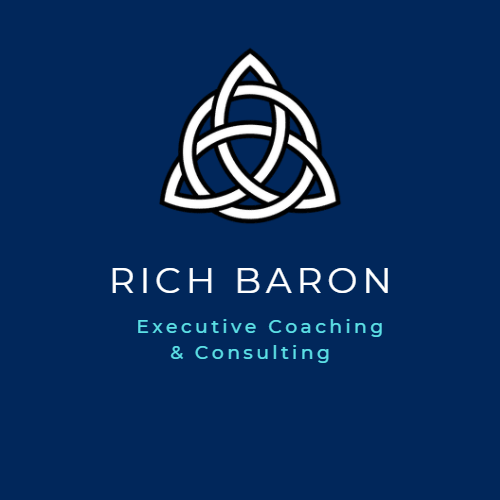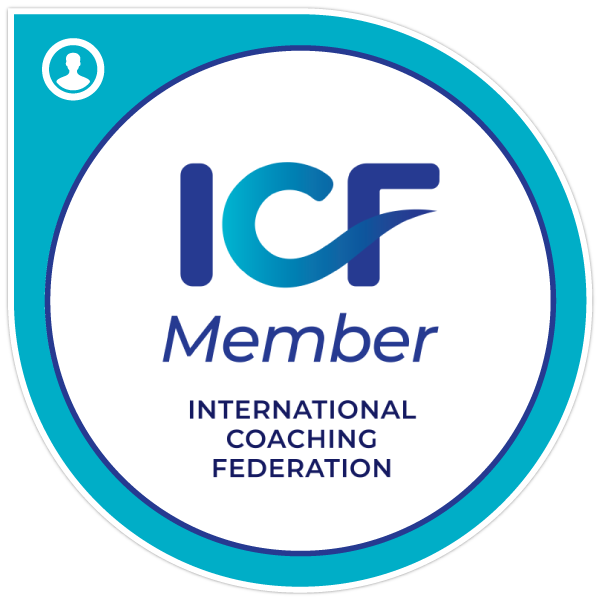AI Can Simulate Leadership — But It Can’t Shape It
Rich Baron • November 4, 2025
You Can Automate Systems — But You Can’t Automate Self-Awareness.
AI is rewriting the rules of business, productivity, and communication — but there’s one area it will never own: executive coaching. True leadership growth doesn’t come from algorithms; it comes from awareness, reflection, and human connection. This article explores why coaching is irreplaceable in the age of AI and how it will define the next era of leadership.
The Rise of AI — and the Temptation to Automate Everything
Artificial Intelligence is rapidly becoming woven into every corner of organizational strategy. It indexes information at lightning speed, produces analytics once thought impossible, screens candidates for “fit,” and generates conversations that feel increasingly human. For businesses under pressure to move faster, scale globally, and operate more efficiently, AI feels like the perfect solution. And in many areas — it is.
AI is transforming operations, productivity, forecasting, customer support, and access to knowledge. It is redefining how work gets done and who is able to do it. But as organizations accelerate automation, a risky mindset is emerging:
If AI can do it faster… AI must do it better.
This assumption may hold true for systems and processes — but not for people. Leadership development cannot be rushed, outsourced, or automated. You cannot produce a great leader the same way you produce a dashboard. Developing a leader isn’t about data — it’s about depth.
It requires self-awareness, emotional maturity, and the willingness to confront uncomfortable truths.
AI can help leaders gather insight, but it cannot help them internalize it.
AI can present options, but it cannot strengthen inner readiness.
AI can simulate empathy, but it cannot feel connection.
The journey to authentic leadership is human by design — reflective, relational, and personal. No machine, no matter how advanced, can replicate the inner transformation required to lead others with courage and purpose.
Data Can Inform — But It Can’t Transform
AI excels at collecting information. It can track behaviors, score competencies, and benchmark leaders against models of success. It can reveal patterns that humans might miss — and often in seconds. Leaders are increasingly receiving dashboards filled with insights about who they are and how they operate. But information alone does not create transformation.
Leadership assessments and AI-driven summaries are snapshots, not stories. They tell us what is happening, but not why. They highlight outcomes, but not identity. They lack the emotional and experiential context that defines a leader’s journey:
- What fears drive their decisions?
- What insecurities shape their communication style?
- What values anchor them during high-stakes moments?
- What deeper purpose fuels their ambition and behavior?
That’s the work of human development — and the work of coaching.
Executive coaching transforms data into self-awareness — and self-awareness into sustainable behavioral change.
It gives leaders a rare, non-judgmental space to pause, reflect, and explore the deeper drivers behind their decisions. In that space, they confront blind spots, realign intentions, and make conscious choices about the kind of leader they want to become.
- An algorithm can reveal a weakness. A coach helps you turn it into strength.
- Data can highlight what’s missing. A coach helps you understand why it matters.
- AI can identify patterns. A coach helps you change behaviors.
- Technology can show you where you stand. A coach helps you see who you can become.
The most important breakthroughs in leadership don’t come from knowing a metric — they come from changing a mindset. And transformation like that only happens through human connection, not automation.
Leadership Is Not a Formula
AI thrives on pattern recognition — identifying what has worked before and predicting what might work again. But leadership isn’t a pattern. Leadership is a paradox.
The most effective leaders embody qualities that appear to contradict each other:
- Confident enough to decide — humble enough to listen
- Compassionate toward people — courageous in accountability
- Consistent in values — adaptive in execution
- Strategic in thought — empathetic in communication
These tensions don’t resolve into a simple formula. They must be navigated with wisdom, not algorithms. That’s where executive coaching becomes indispensable. A coach doesn’t simply assess a leader’s performance. They reveal what is beneath performance — the beliefs, fears, motivations, and habits that drive behavior. They help leaders reconcile the paradoxes of influence — not by choosing one side or the other, but by elevating their capacity to do both. Because leadership is not defined by effectiveness alone. It’s defined by impact — how a leader makes people feel, think, trust, and follow. And impact is a profoundly human experience. Relationships are built through vulnerability, lived experience, and emotional presence — things AI can analyze or imitate, but not genuinely feel. Machines can provide data. Only humans can offer meaning. Leadership isn’t an equation to solve. It’s a relationship to build — and a responsibility to grow into.
The Human Edge: Empathy, Intuition, and Accountability
What sets executive coaching apart from technology isn’t information — it’s interpretation and connection. AI can process data. But coaches understand people.
A skilled coach brings emotional intelligence and intuition — the ability to:
- Hear the hesitation behind a confident statement
- Notice defensiveness masked as certainty
- Recognize when a leader is operating from fear rather than purpose
- Sense the moment when silence is saying more than words
These insights come from presence, not programming.
Coaches ask the kinds of questions that no algorithm could generate. Not because the questions are complex — but because they are personal:
“What are you afraid will happen if you let others lead?”
“What story are you still living that no longer serves you?”
“What would courage look like for you in this moment?”
Through these conversations, coaches help leaders articulate what they truly want — and confront what’s holding them back.
And then comes the part AI can never replicate: human accountability. AI may remind you of commitments. A coach helps you honor them. Coaches don’t enforce deadlines. They inspire discipline — not the fear-based kind, but the kind rooted in identity and values. They hold a mirror up to behavior while also holding belief in your potential — compassion and challenge in equal measure. Accountability doesn’t last because a rule is enforced; it lasts because someone believes in who you can become.
AI can improve performance.
A coach improves the person performing — and that is where transformation truly happens.
Coaching in the Age of AI: Partnership, Not Competition
The rise of AI has created a false narrative: that technology and human capability are at odds. But the organizations that will thrive in the future won’t choose one or the other — they will unlock the power of both.
AI brings extraordinary advantages to leadership development:
- Faster access to insights
- Real-time performance trends
- Predictive talent analytics
- Automated workflows that save leaders hours each week
But data doesn’t drive change. People do!
AI can reveal where growth is needed. Coaching helps leaders step into that growth — confidently and consistently. AI is the dashboard. Coaching is the driver. When combined, the two create a leadership development engine that is both intelligent and transformational:
AI Provides
Coaching Delivers
Information Self-awareness
Patterns Purpose
Forecasts Focus
Insights Integration
Measurement Meaning
Reminders Responsibility
In this partnership, AI serves as the tool, not the teacher. It assists — but it cannot advance character, integrity, courage, or wisdom.
The role of the executive coach doesn’t diminish with AI — it becomes more essential. Leaders must now navigate a complex intersection of:
- Ethical decision-making
- Human impact of automation
- Increasing uncertainty and speed
- Cross-cultural collaboration
- Mental and emotional resilience
AI can enhance execution, but it cannot elevate emotional maturity — the critical trait that determines whether leaders use power to serve or self-protect. As AI advances, the need for deeply human leadership grows stronger: empathetic, courageous, self-aware, and committed to bringing out the best in others. Technology may change the world, but people will always be the ones who shape its future.
A Message to Leaders: Don’t Outsource Your Growth
If you’re a leader seeking development, AI can offer information — but not transformation. It can provide answers — but not awaken anything in you. It can show you the gap — but it can’t help you cross it.
AI will tell you what you already did. A coach helps you discover who you can become.
You can automate a task.
You cannot automate courage.
You cannot automate humility.
You cannot automate character.
Those things are earned through challenge, reflection, and the willingness to change. Leadership is not shaped by convenience. It’s shaped by conversations that make you uncomfortable, decisions that test your values, and moments that stretch your capacity to serve others.
Your leadership journey is uniquely human — formed by your experiences, the obstacles that strengthened you, and the relationships that defined you. AI has no access to that story. It does not know what it took for you to get here — and what it will take for you to rise to the next level.
A coach helps you navigate that human terrain — the internal landscape where doubt, ego, purpose, and passion collide. Not by giving you the answers, but by helping you confront the questions that truly matter:
- What drives you?
- Who do you want to become?
- Who are you here to serve?
- What will your leadership legacy be?
The leaders who stand out in the age of AI will not be the ones who learn faster — but the ones who grow deeper.
Don’t outsource your development.
Don’t delegate your becoming.
Your leadership — and the lives you impact — are far too important. The future needs human leaders, and your transformation starts with the decision to grow.
The Future Belongs to Human-Centered Leadership
AI will undoubtedly continue to reshape work — redefining jobs, accelerating decision-making, and changing how organizations operate at every level. Automation will handle more tasks, and data will guide more choices. But the essence of leadership has never been about tasks or data points. It has always been — and will always be — about people.
Great leadership isn’t measured by efficiency or processing speed; it’s measured by influence, inspiration, trust, and impact. Leaders must help humans navigate uncertainty, embrace change, solve conflict, and find meaning in their work. AI can support the what and how — but only human leadership can define the why. This is exactly where executive coaching shines.
Coaching develops the inner architecture of a leader — character, courage, emotional intelligence, and the integrity needed to steward others through change. It ensures leaders don’t just adopt new technologies, but wield them responsibly, ethically, and inclusively.
As automation expands, human skills become premium, not disposable:
- Empathy — understanding what people need
- Wisdom — using judgment that data alone can’t provide
- Connection — building trust that unlocks performance
- Purpose — aligning vision with values
- Resilience — inspiring hope in moments of disruption
These are the qualities that drive belonging, creativity, and performance — and they are uniquely human.
Artificial Intelligence may be the power that transforms business. But human leadership will remain the power that transforms people.
The organizations that win in the next era will be those that invest in developing leaders who can lead both technology and humanity — with awareness, authenticity, and heart. Because when everything else becomes automated, being deeply human becomes the ultimate competitive advantage.
About the Author
Rich Baron is the Chief Operating Officer and Director of Global Coaching Projects at John Mattone Global (JMG), where he also serves as a Master Certified Intelligent Leadership Executive Coach. With more than 30 years of experience in cultural transformation, operational leadership, and executive development, Rich has a proven track record of helping leaders at every level — from emerging talents to seasoned CEOs — unlock their potential and build high-performance cultures.
Rich is also the co-host of Mainline Executive Coaching ACT, recognized by FeedSpot as one of the top executive coaching podcasts worldwide. The show’s recognition is based on global rankings across web traffic, social media influence, and audience engagement, reflecting its growing impact on leaders and organizations around the world.




